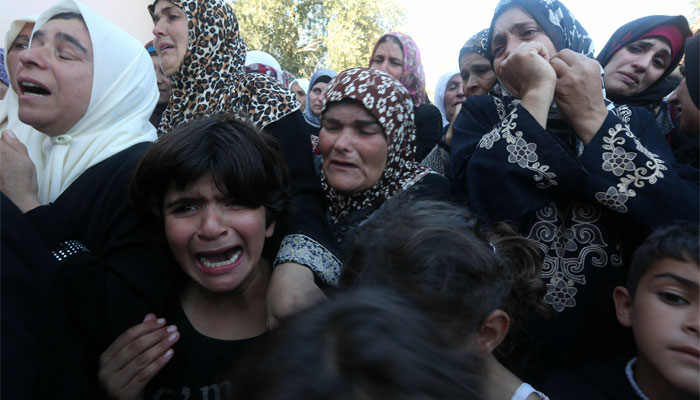Relatives of 18-year-old Palestinian Mahmud Nazal mourn during his funeral in the village of Qabatiya, south of the West Bank city of Jenin. AFP
Reuters/Jerusalem
Israel is refusing to return the bodies of Palestinians killed during a month-old surge of violence unless the Palestinian side agrees to keep their funerals "modest", the Israeli defence minister said on Sunday.
In the latest incidents, a Palestinian tried to stab an Israeli soldier during disturbances near Hebron, in the occupied West Bank, on Sunday and was shot dead, the army said. That account could not immediately be confirmed independently.
Later in the afternoon at the same location, a driver rammed three Israeli paramilitary border policemen with his car before fleeing the scene, police said. The three, whose lives were not thought to be in danger, were taken to hospital and forces mounted a search for the driver.
Since Oct. 1, at least 66 Palestinians have been killed by Israeli gunfire. Of those, 39 were assailants armed mainly with knives, Israel said, while others were shot during violent anti-Israel protests. Many were teenagers.
Eleven Israelis have been killed in stabbings and shootings by Palestinians motivated in part by Muslim agitation at stepped-up Jewish visits to a contested Jerusalem shrine.
Israel, which in the past has kept the bodies of slain militants as a punitive measure or to trade for the remains of its soldiers, has returned eight corpses of alleged Palestinian assailants for burial since last week.
Palestinian monitors say Israel is still holding 21 bodies, a tally not immediately confirmed by Israeli officials.
The Israeli handovers have raised hackles among some rightists in Prime Minister Benjamin Netanyahu's coalition and were acknowledged as a reversal of policy on Sunday by Defence Minister Moshe Yaalon.
Briefing reporters, Yaalon said the security cabinet had initially intended to withhold the bodies but reassessed that because of the resentment it stirred among Palestinians, many of whom question whether those killed had posed a lethal threat to Israelis.
"Modest family affairs"
On two occasions where Israel handed over bodies for burial, Palestinian President Mahmoud Abbas's U.S.-backed administration "met our conditions" by ensuring the funerals were "modest family affairs, held at night", Yaalon said.
He said a third handover, at the flashpoint city of Hebron, was halted before all the bodies were delivered because "they (Palestinians) in effect allowed a popular funeral that we saw as a security threat" as it inflamed anti-Israel passions.
He appeared to be referring to the burial of five of the Palestinians in Hebron on Saturday, which was attended by tens of thousands of mourners including Palestinian officials.
Two more Palestinians were buried in Hebron on Sunday, but the event was on a smaller scale, with hundreds attending.
"Where there is a commitment to quiet, modest funerals, we will continue to return (bodies). Where there is not, we will not return them, even if that means us burying them here," Yaalon said.
Abbas's administration, whose ties with the Netanyahu government have been strained by the deadlock in peacemaking since 2014 but which still quietly coordinates security with Israel, denied agreeing to the burial terms laid out by Yaalon.
"They proposed this to us and we totally rejected it, informing the Israeli side that it was the right of the Palestinian people to dignify their martyrs as they wish," Civil Affairs Minister Hussein Al-Sheikh told Reuters.
"They (alleged assailants) were killed by Israeli aggression. Most were killed for allegedly holding knives, though investigations showed the opposite," he said. He did not elaborate on the investigations he was referring to.
The spate of Palestinian-Israeli violence is the worst since the 2014 Gaza war, and arose in part from religious and political tensions over al-Aqsa mosque compound in Jerusalem's walled Old City that is sacred to both Muslims and Jews.
A growing number of visits by religious Jews to al-Aqsa plaza - Islam's holiest site outside Saudi Arabia and revered in Judaism as the location of two destroyed biblical temples - have stirred Palestinian allegations that Israel is violating a "status quo" under which non-Muslim prayer there is banned.
Israel says such allegations are false and that their voicing by Palestinian officials and circulation in Arab social media has been inciting the violence.

